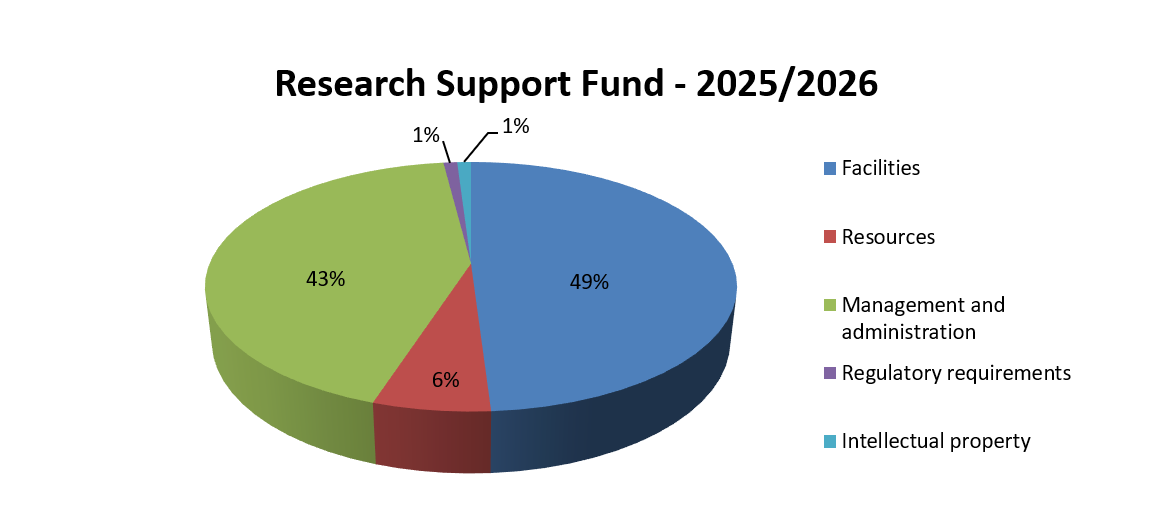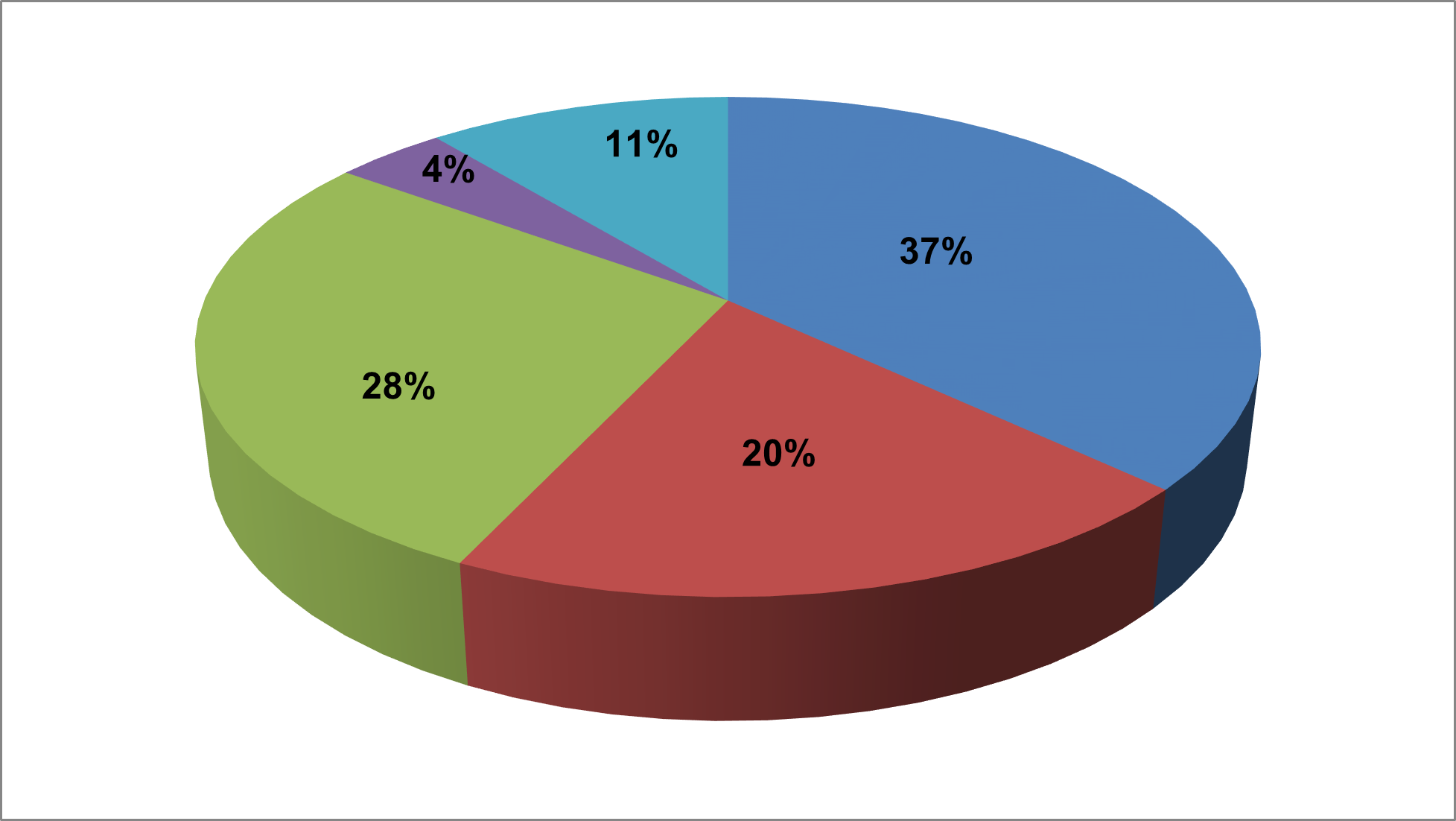The amount of Waterloo’s Research Support Fund (RSF) is calculated using a formula that is based on the amount of funding awarded in the previous three fiscal years by Federal granting agencies. According to this calculation, in 2025/2026 Waterloo will receive an RSF allocation of $9,824,119. This allocation is divided into five Research Support Fund categories to support Waterloo's research objectives:

A portion of this allocation is retained to support central research administration and core facilities, and the rest of the allocation is distributed to Waterloo faculties, where eligible costs are incurred.
Indirect costs of research are real costs to the University, including but not limited to items such as occupancy cost, building use, central administration, library costs and central computing services costs.
The Research Support Fund is the major source of funding for infrastructure support used to attract and retain high-quality researchers to the professoriate at Waterloo. Attracting the best is an increasingly competitive activity; the flexibility afforded by the Research Support Fund is crucial to our success.
Performance objectives
Research facilities
2025-2026
| Institutional performance objective |
|
|---|---|
| Indicator |
|
| Outcomes |
Target
|
2024-2025
| Institutional performance objective |
|
|---|---|
| Indicator |
|
| Outcomes |
Target
Actual
|
2023-2024
| Institutional performance objective |
|
|---|---|
| Indicator |
|
| Outcomes |
Target
Actual
|
2022-2023
| Institutional performance objective |
|
|---|---|
| Indicator |
|
| Outcomes |
Target
Actual
|
2021-2022
| Institutional performance objective |
|
|
|---|---|---|
| Indicator |
|
|
| Outcomes |
Target
Actual
|
|
2020-2021
| Institutional performance objective |
|
|
|---|---|---|
| Indicator |
|
|
| Outcomes |
Target
Actual
|
|
2019-2020
| Institutional performance objective |
|
|
|---|---|---|
| Indicator |
|
|
| Outcomes |
Target
Actual
|
|
2018-2019
| Institutional performance objective |
|
|
|---|---|---|
| Indicator |
|
|
| Outcomes |
Target
Actual
|
|
2017-2018
| Institutional performance objective |
|
|
|---|---|---|
| Indicator |
|
|
| Outcomes |
Target
Actual
|
|
2016-2017
| Institutional performance objective |
|
|
|---|---|---|
| Indicator |
|
|
| Outcomes |
Target
Actual
|
|
Research resources
2025-2026
| Institutional performance objective |
|
|---|---|
| Indicator |
|
| Outcomes |
Target
|
2024-2025
|
Institutional performance objective |
|
|---|---|
| Indicator |
|
| Outcomes |
Target
Actual
|
2023-2024
|
Institutional performance objective |
|
|---|---|
| Indicator |
|
| Outcomes |
Target
Actual
|
2022-2023
| Institutional performance objective |
|
|---|---|
| Indicator |
|
| Outcomes |
Target
Actual
|
2021-2022
| Institutional performance objective |
|
|---|---|
| Indicator |
|
| Outcomes |
Target
Actual
|
2020-2021
| Institutional performance objective |
|
|---|---|
| Indicator |
|
| Outcomes |
Target
Actual
|
2019-2020
| Institutional performance objective |
|
|---|---|
| Indicator |
|
| Outcomes |
Target
Actual
|
2018-2019
| Institutional performance objective |
|
|---|---|
| Indicator |
|
| Outcomes |
Target
Actual
|
2017-2018
| Institutional performance objective |
|
|
|---|---|---|
| Indicator |
|
|
| Outcomes |
Target
Actual
|
|
2016-2017
| Institutional performance objective |
|
|
|---|---|---|
| Indicator |
|
|
| Outcomes |
Target
Actual
|
|
Management and administration
2025-2026
| Institutional performance objective |
|
|---|---|
| Indicator |
|
| Outcomes |
Target:
|
2024-2025
| Institutional performance objective |
|
|---|---|
| Indicator |
|
| Outcomes |
Target
Actual
|
2023-2024
| Institutional performance objective |
|
|---|---|
| Indicator |
|
| Outcomes |
Target
Actual
|
2022-2023
| Institutional performance objective |
|
|---|---|
| Indicator |
|
| Outcomes |
Target
Actual
|
2021-2022
| Institutional performance objective |
|
|---|---|
| Indicator |
|
| Outcomes |
Target
Actual
|
2020-2021
| Institutional performance objective |
|
|---|---|
| Indicator |
|
| Outcomes |
Target
Actual
|
2019-2020
| Institutional performance objective |
|
|---|---|
| Indicator |
|
| Outcomes |
Target
Actual
|
2018-2019
| Institutional performance objective |
|
|---|---|
| Indicator |
|
| Outcomes |
Target
Actual
|
2017-2018
| Institutional performance objective |
|
|
|---|---|---|
| Indicator |
|
|
| Outcomes |
Target
Actual
|
|
2016-2017
| Institutional performance objective |
|
|
|---|---|---|
| Indicator |
|
|
| Outcomes |
Target
Actual
|
|
Regulatory requirements and accreditations
2025-2026
| Institutional performance objective |
|
|---|---|
| Indicator |
|
| Outcomes |
Target
|
2024-2025
| Institutional performance objective |
|
|---|---|
| Indicator |
|
| Outcomes |
Target
Actual
|
2023-2024
| Institutional performance objective |
|
|---|---|
| Indicator |
|
| Outcomes |
Target
Actual
|
2022-2023
| Institutional performance objective |
|
|---|---|
| Indicator |
|
| Outcomes |
Target
Actual
|
2021-2022
| Institutional performance objective |
|
|---|---|
| Indicator |
|
| Outcomes |
Target
Actual
|
2020-2021
| Institutional performance objective |
|
|---|---|
| Indicator |
|
| Outcomes |
Target
Actual
|
2019-2020
| Institutional performance objective |
|
|---|---|
| Indicator |
|
| Outcomes |
Target
Actual
|
2018-2019
| Institutional performance objective |
|
|---|---|
| Indicator |
|
| Outcomes |
Target
Actual
|
2017-2018
| Institutional performance objective |
|
|---|---|
| Indicator |
|
| Outcomes |
Target
Actual
|
2016-2017
| Institutional performance objective |
|
|---|---|
| Indicator |
|
| Outcomes |
Target
Actual
|
Intellectual property
2025-2026
| Institutional performance objective |
|
|---|---|
| Indicator |
|
| Outcomes |
Target:
|
2024-2025
| Institutional performance objective |
|
|---|---|
| Indicator |
|
| Outcomes |
Target
Actual
|
2023-2024
| Institutional performance objective |
|
|---|---|
| Indicator |
|
| Outcomes |
Target
Actual
|
2022-2023
| Institutional performance objective |
|
|---|---|
| Indicator |
|
| Outcomes |
Target
Actual
|
2021-2022
| Institutional performance objective |
|
|---|---|
| Indicator |
|
| Outcomes |
Target
Actual
|
2020-2021
| Institutional performance objective |
|
|---|---|
| Indicator |
|
| Outcomes |
Target
Actual
|
2019-2020
| Institutional performance objective |
|
|---|---|
| Indicator |
|
| Outcomes |
Target
Actual
|
2018-2019
| Institutional performance objective |
|
|---|---|
| Indicator |
|
| Outcomes |
Target
Actual
|
2017-2018
| Institutional performance objective |
|
|---|---|
| Indicator |
|
| Outcomes |
Target
Actual
|
2016-2017
| Institutional performance objective |
|
|---|---|
| Indicator |
|
| Outcomes |
Target
Actual
|
2024/2025 - Total amount awarded $10,016,457

2023/2024 - Total amount awarded $10,358,029

2022/2023 - Total amount awarded $10,593,544

2021/2022 - Total amount awarded $10,840,873

2020/2021 - Total amount awarded $11,083,227

2019/2020 - Total amount awarded $11,113,643

2018/2019 - Total amount awarded $11,423,252

2017/2018 - Total amount awarded $11,308,563

2016/2017 - Total amount awarded $11,236,810

